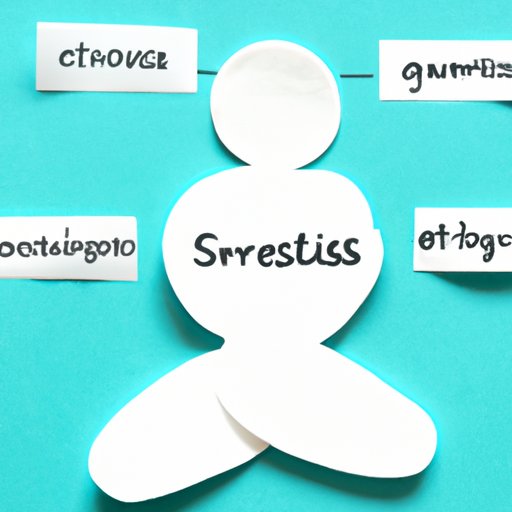
Introduction
If you’ve ever been under stress, you’ve probably noticed the uncomfortable effects on your body, including digestive issues like constipation. It might seem strange that psychological stress could cause physical issues like constipation, but there’s a lot more to the mind-gut connection than we might think. Understanding this link is important for maintaining good overall health and wellbeing.
The Impact of Stress on Digestive Health and Constipation
Constipation is a condition in which bowel movements become infrequent, hard, or painful. It’s experienced by millions of people worldwide and can be caused by a variety of factors, including stress. Research suggests that stress can have a significant impact on gut health and function, leading to constipation.
Stress affects the digestive system in several ways. Stressful situations can slow down the movement of food through the digestive tract, which can lead to constipation. This may be due to a rise in stress-related hormones like cortisol and epinephrine, which can affect the normal contractions of the digestive muscles.
In addition to hormonal changes, stress can also affect the balance of bacteria in your gut, known as the gut microbiome. When this balance is disrupted, it can lead to digestive issues like constipation.
Scientific research has also shown a strong relationship between stress and constipation. One study found that patients with chronic constipation were more likely to report high levels of stress compared to those without constipation. Another study found that among patients with irritable bowel syndrome (IBS), a condition often associated with constipation, stress was a significant predictor of symptom severity.
How Psychological Stress Messes with Your Gut and What You Can Do About It
There are two types of stress: acute stress, which is short-term and can be beneficial; and chronic stress, which is more long-lasting and can have negative effects on health. Acute stress can actually be beneficial for your digestive system, as it can stimulate the release of digestive enzymes and improve gut motility. However, chronic stress can have significant negative effects on the digestive system, including constipation.
Chronic stress can lead to inflammation in the gut, which can damage the intestinal lining and affect gut motility. It can also disrupt the balance of bacteria in the gut, leading to dysbiosis. Dysbiosis has been linked to digestive issues like constipation, bloating, and diarrhea.
If you’re experiencing chronic stress, there are several things you can do to help manage it. Mindfulness meditation, deep breathing exercises, and regular exercise have all been shown to be effective at reducing stress levels and promoting relaxation.
The Ill Effects of Prolonged Stress on the Digestive System and Why Constipation is a Telltale Sign
When stress becomes chronic, it can lead to chronic constipation. Prolonged stress can affect the normal contractions of the digestive muscles, leading to slower and more infrequent bowel movements. Over time, this can lead to chronic constipation, which is typically defined as having fewer than three bowel movements per week for at least three months.
Other negative effects of chronic stress on the digestive system include inflammation, damage to the intestinal lining, and dysbiosis. These issues can lead to a host of digestive problems, including acid reflux and diarrhea.
Constipation can be a reliable indicator of chronic stress, as it is often a long-term symptom of stress-related digestive issues. If you’re experiencing chronic constipation, it’s important to seek medical attention to rule out any underlying health conditions.
How to Recognize the Link Between Stress and Constipation, and Tips to Manage Both
If you’re experiencing stress-related constipation, there are several things you can do to manage both the stress and the constipation. Recognizing the symptoms of each issue is the first step. Symptoms of stress include anxiety, fatigue, and difficulty concentrating, while symptoms of constipation include infrequent bowel movements, hard stools, and abdominal discomfort.
Simple lifestyle changes can also help alleviate stress and constipation. Eating a high-fiber diet, drinking plenty of water, and regular exercise can all help promote healthy digestion and reduce stress levels. Mindfulness techniques like meditation and deep breathing exercises can also be effective at reducing stress and promoting relaxation.
Stress and Constipation: A Closer Look at the Complex Relationship Between Mind and Gut
The gut-brain axis is the connection between the digestive system and the central nervous system. This relationship is complex, and stress can affect every aspect of digestive health, from the release of digestive enzymes to the contractions of the digestive muscles. Stress can also affect other aspects of digestive health, including acid reflux and diarrhea.
Understanding the gut-brain axis is crucial for maintaining good digestive health. By recognizing the link between stress and constipation, we can take steps to manage both issues and promote optimal digestive function.
When Your Bowel Movements Slow Down Due to Stress: Understanding Constipation and What You Can Do to Alleviate It
Constipation is defined as having fewer than three bowel movements per week for at least three months. It can be caused by a variety of factors, including stress. Other common causes include a low-fiber diet, lack of physical activity, and certain medications.
If you’re experiencing severe or chronic constipation, medical treatments may be necessary. Laxatives, enemas, and other medications can help alleviate constipation and improve bowel function. However, lifestyle changes are typically the first line of defense against stress-related constipation.
Simple changes like eating a high-fiber diet, drinking plenty of water, and engaging in regular exercise can all help promote healthy digestion and reduce stress levels. Stress reduction techniques like meditation, deep breathing exercises, and yoga can also be effective at reducing stress levels and promoting relaxation.

Constipation and Stress: A Practical Guide to Keeping Your Digestive System Running Smoothly Even in Times of Great Stress
To prevent constipation caused by stress, it’s important to maintain good overall digestive health. This means eating a healthy diet, staying hydrated, engaging in regular physical activity, and managing stress levels.
If you’re under a lot of stress, make sure to take the time to practice self-care and relaxation techniques. Engage in activities that promote relaxation and reduce stress, such as meditation, yoga, or spending time in nature. By prioritizing your mental and physical wellbeing, you can keep your digestive system running smoothly even in times of great stress.
Conclusion
Stress-related constipation is a common issue that affects millions of people worldwide. By understanding the complex relationship between stress and the digestive system, we can take steps to manage both issues and promote optimal digestive health. Simple lifestyle changes like eating a healthy diet, staying hydrated, and engaging in regular exercise can go a long way in promoting healthy digestion and reducing stress levels. However, it’s also important to seek medical attention if you’re experiencing severe or chronic constipation.





